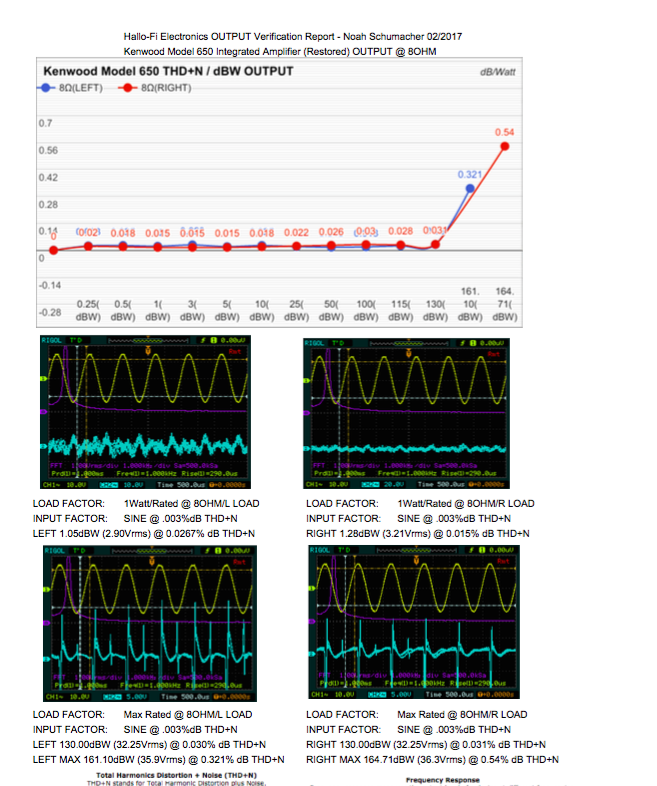Fisher 800C Receiver
Today were featuring a very special tube receiver..the Fisher 800C considered by many to be one of the best receivers ever made available. The Fisher 800C was released after the early 500/800B in 1962 as an upgrade to the Fisher 500C which did not include AM reception and MPX integration. The Fisher 400/500/800C utilize a compliment of 7591 power tubes for a 30-35W .7% THD rated output factory output with a fixed bias.
As often with these old tube amplifiers, and receivers their are a few major contenders that need to be addressed such as the coupling network for the output stage, modify the 7591 fixed bias topologies amongst others outlined below.
7591 Output Stage
Several modification were integrated into the output stage which allows for bias matching between 7591, regulating the negative bias voltage and changing the coupling networks and grid resistors.
The original designed uses a .047/400V coupling capacitors with a 330K grid resistor. For more reliability and to handles todays tubes better we replaced the grid resistors with 200K ohm resistors to limit the value of reverse grid current voltage under maximum rated dissipation. In connection we replaced the 7591 coupling capacitors with four .1/630V high grade MKP polypropylene film capacitors with a noted increase in operating voltages in order to help maintain time constance in the RC coupling circuit at the driver/output stage with the decrease in grid resistor resistance.
After the coupling stage is complete we move onto the 7591 screen stability modifications which is straight forward; I isolated each 7591 from the original buss lead and daisy chained the Pin 1 input with a inline 100OHM resistors to pin 4 after relocation the Pin#8 feed, this effectively eliminates transient arching that can severely damage tubes.
Finally for the output stage we integrate what called a IBAM designed by Drew Bolce for early Fisher versions. The IBAM (Independent Bias Adjustment Modification) removes the fixed bias circuit and allows the individual bias adjustment of each 7591 output respectively to 32mA draw. The IBAM was built using low impedance high temp (105C) Nichicons after trying out FC Panasonics first and carbon film resistors then installed on the chassis through a new mounting point near the output tubes…along with the Bias 10OHM cathode resistor modification allows for easier and accurate bias settings. Last checked I was able to adjust to a perfect -22.05Vdc @ 30mA-30.5mA for all four 7591 :) ... nice
PS Modifications
With the above IBAM modification we installed a way to attenuate the negative dc voltage rails for the bias circuit and pre-tubes using a 10K precision Bourns potentiometer along with replacing the original Siemens selenium bridge rectifier with a modern BR3 type 8A 400V+ bridge rectifier. As the negative voltage is increased this reduces our current draw allow to dial in the appropriate voltage for biasing modern tubes. Often times the required -22V is lacking in unrestored models causing bias issues.
The original cardboard dual capacitors was replaced with 1000MFD low impedance high temp (105C) Nichicon PW capacitors as well as the associated .1MFD film to a high grade Mundorf Tube M Cap 630V. The B+ developing diodes CR6/7 were replaced with modern 3A Fairchild diodes. The .01 large axial capacitors were replaced again with high grade Mundorf EVO Oil type .01/630V film capacitors for better protection and filtering.
The remaining capacitors for the 12AX7 drivers were replaced with high grade MKP polypropylene film capacitors with an increase to 630V operating voltages. The original axial electrolytic were replaced with low impedance high temp (105C) Nichicon PW capacitors with an increase in operative voltages as well as associated carbon film resistor changes. Also replaced with the C111 8MFD to a high grade MKP polypropylene 630V film capacitor.
The front end AM/FM capacitors were all replaced with high grade WIMA polypropylene 630V rated and MKP polypropylene 630V film capacitors including the MPX 1MFD and all associated .022MFD/.047 couplings.
New LED’s installed in both front glass slides and Meter indicators.
Audio Notizen





































































